This weekend, friends, family, colleagues and admirers got together to celebrate the life, and mourn the death, of a man many consider to be the most talented architect Canada has ever produced. Frank Gehry may have been born in Canada, but Arthur Erickson began, remained and died a great Canadian. He was also one of the World's architectural greats, and a "citizen of the World".
This weekend, friends, family, colleagues and admirers got together to celebrate the life, and mourn the death, of a man many consider to be the most talented architect Canada has ever produced. Frank Gehry may have been born in Canada, but Arthur Erickson began, remained and died a great Canadian. He was also one of the World's architectural greats, and a "citizen of the World".
Arthur was also a great Vancouverite, casting a long shadow in this city in buildings, public spaces, attitudes and influence. He was considered a major force in the creation of "vancouverism", that term that sometimes makes us cringe, but reflects the role Vancouver has taken globally as an alternative and progressive model of city-building. And he was the mentor and teacher of many other great local architects and urbanists, including Bing Thom, James Cheng, Bruno Freschi, Werner Forster, Brian Hart, John Keith-King, Joe Wai, Noel Best, Rainer Fassler, Milton Gardiner, Norm Hotson, Eva Matsuzaki, Kiyoshi Matsuzaki, Tony Robins, Jim Wright, Barry Johns, Brigitte Shim, and many more. Even our own brilliant recently-retired Assistant Director of Central Area Planning, Trish French, spent key formative years working for Arthur early on.
Recently, Arthur even grew from mere great architect, to "brand", illustrated in the naming of a mixed-use waterfront building "the Erickson", and in the ability his name-attachment had in selling out projects. This caused some local debate and nervousness (is it ever a good thing for an architect to become a brand?), but was reflective of the iconic status he had in the city and country.
I myself had the privilege of getting to know Arthur only a little bit since I arrived here in 2006, through about a dozen conversations at events about-town. Although he was still working, his health challenges had already taken their toll, and his partner Nick Milkavich (a great architect himself, who continues to lead a great design staff in the spirit of Arthur) was more engaged in the day-to-day. Still, I treasured the small chances I had to talk with Arthur. Despite his failing health, I always found him gracious, still very engaged and concerned for the city, and as charming as I had heard. I also found myself slightly jealous of the opportunities that my predecessors had, to engage with Arthur in his prime, to experience that famous stubbornness and witness that absolute confidence of urbanistic principle and architectural command. That would have been fun, and an honour.
Most of Arthur's designs were executed during a period of architectural styles that have long fallen out of favour. Like many contemporary urbanists, I don't have many positive things to say about the modernist architectural movement (although I admire good contemporary architecture, which is a very different thing), and have a clear distain in particular for the modernist planning movement, given all the damage it did to cities. Although he practiced at the same time and was occasionally confused with the 60's-80's modernists, Arthur was different. He understood urbanism and cities better. In many ways he defied architectural classification, and was way ahead of his time in sensitive design, in his gift for marrying building to site, and sustainable thinking. He became synonymous with Canadian west-coast contemporary design. He was an artist with concrete, a material I usually have difficulty appreciating. While we may debate some design-ideas with the benefit of time and learning (such as whether even a brilliantly designed sunken plaza like Robson Square in downtown Vancouver, was a good idea given that sunken plazas have been shown to generally fail as vibrant people-places almost all the time - we'll have a chance to see if new respectful design changes timed for the Square's use during the 2010 Winter Olympics will help improve the connections between the plaza and Robson Street), we don't debate the remarkable built legacy Arthur has left our city.
Regrettably, I was committed to be out-of-town this weekend, and missed Arthur's memorial service. Speaking with many who knew him well and were devastated by his death, it sounds like the event was worthy of Arthur, although as one colleague put it, "so much more needed to be said". You could probably never say enough. So this post is my own small tribute to his life, and his huge contribution to our city and to architecture. Others who really knew him, will do a much better job than I, and perhaps might comment on this post.
For some of those comments, here are links to just some of the many articles written since Arthur's death.
"700 say goodbye to Arthur Erickson at SFU ceremony" The Province
"Hundreds honour ‘poet' of architecture" Globe and Mail
"Memorial service for Arthur Erickson on Sunday" Canadian Architect
"A Canadian icon rediscovered" Macleans.ca
"Architect Arthur Erickson dead at 84" CBC.ca
To end, here also are some images of that contribution, as he will be best remembered through his designs. Although many reference the Museum of Anthropology, my personal favorites might be the Waterfall Building (perhaps the city's best model of mid-rise building), Robson Square, and the Canadian Embassy in Washington (which I've always felt was better than many have suggested). We're blessed with several new buildings to be completed soon, including the aforementioned "Erickson", and the Millennium Water signature buildings and community centre that will sit at the water-edge of the 2010 Winter Olympics Athletes Village.
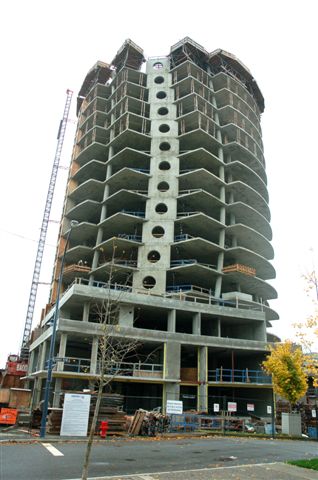
The "Erickson"

Millennium Water - Olympic Village

Waterfall Building
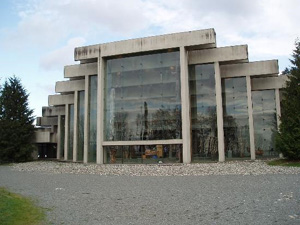
Universtiy of British Columbia Museum of Anthropology
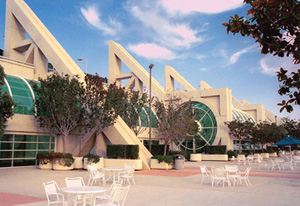
San Diego Convention Centre
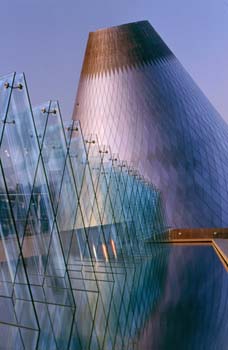
Museum of Glass - Tacoma, Washington
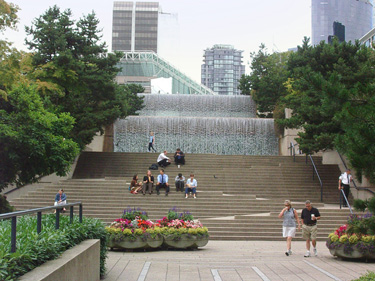
Robson Square / Courthouse

Southeast False Creek Community Centre

"Vancouver's Turn"
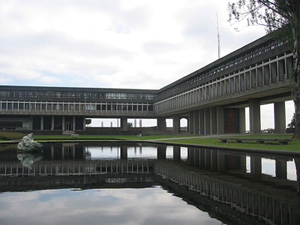
Simon Fraser University
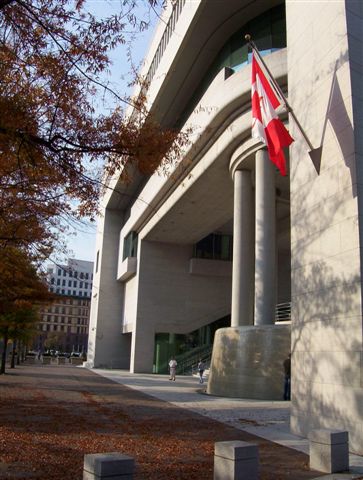
Canadian Embassy, Washington DC
Rest in peace, and thank you Arthur. You are missed already.

Maui's Vacation Rental Debate Turns Ugly
Verbal attacks, misinformation campaigns and fistfights plague a high-stakes debate to convert thousands of vacation rentals into long-term housing.

Planetizen Federal Action Tracker
A weekly monitor of how Trump’s orders and actions are impacting planners and planning in America.

San Francisco Suspends Traffic Calming Amidst Record Deaths
Citing “a challenging fiscal landscape,” the city will cease the program on the heels of 42 traffic deaths, including 24 pedestrians.

Defunct Pittsburgh Power Plant to Become Residential Tower
A decommissioned steam heat plant will be redeveloped into almost 100 affordable housing units.

Trump Prompts Restructuring of Transportation Research Board in “Unprecedented Overreach”
The TRB has eliminated more than half of its committees including those focused on climate, equity, and cities.

Amtrak Rolls Out New Orleans to Alabama “Mardi Gras” Train
The new service will operate morning and evening departures between Mobile and New Orleans.
Urban Design for Planners 1: Software Tools
This six-course series explores essential urban design concepts using open source software and equips planners with the tools they need to participate fully in the urban design process.
Planning for Universal Design
Learn the tools for implementing Universal Design in planning regulations.
Heyer Gruel & Associates PA
JM Goldson LLC
Custer County Colorado
City of Camden Redevelopment Agency
City of Astoria
Transportation Research & Education Center (TREC) at Portland State University
Jefferson Parish Government
Camden Redevelopment Agency
City of Claremont



























